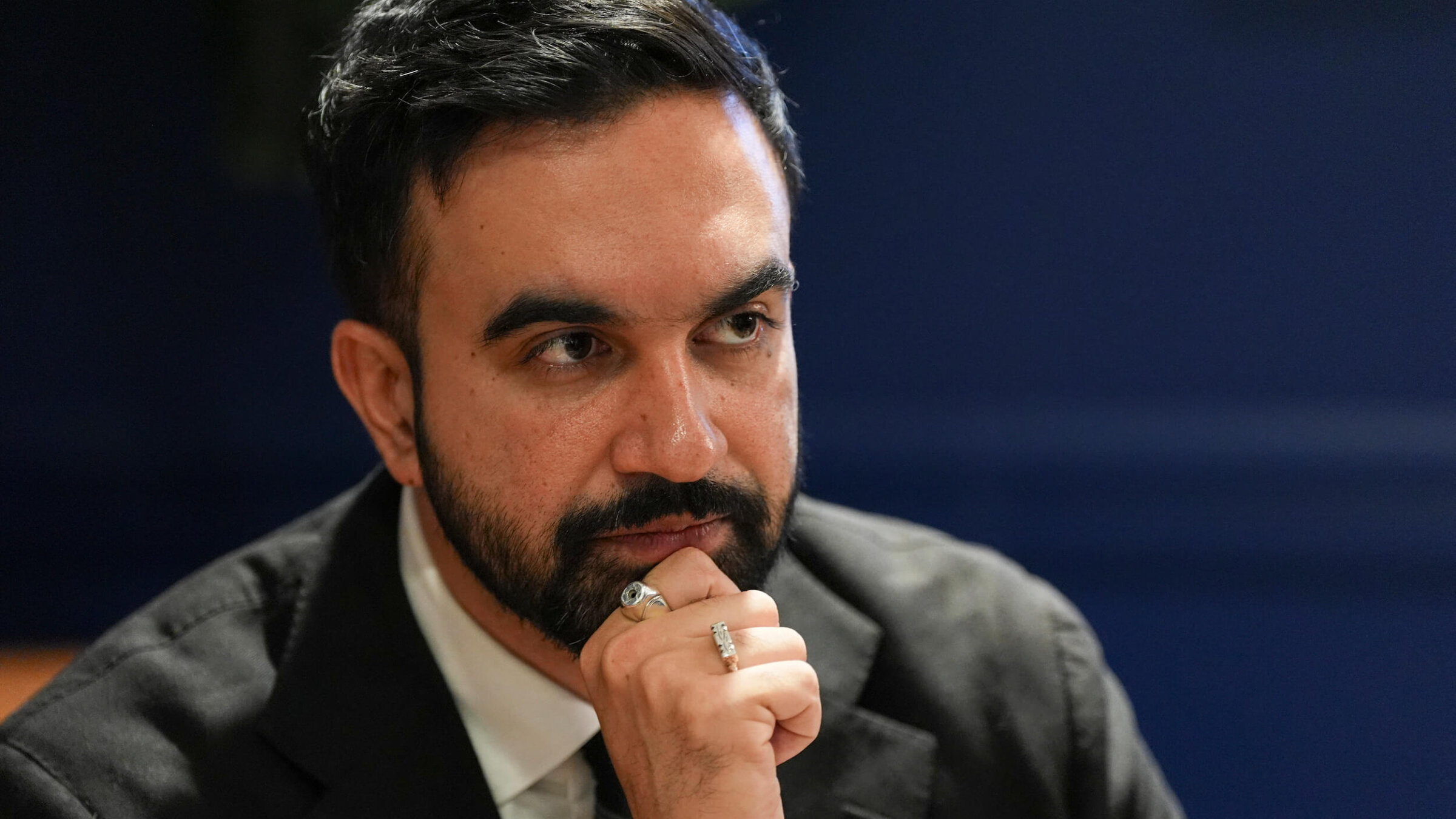Mamdani opposes Zionism, but wants New York public schools to teach about it
The anti-Zionist candidate is backing a curriculum that defines Zionism as ‘the right to Jewish national self-determination’

New York Democratic mayoral candidate Zohran Mamdani on Oct. 16. Photo by Angelina Katsanis / Pool / AFP / Getty Images
Mayoral candidate Zohran Mamdani has announced plans to fight antisemitism in New York City using a curriculum that seems to contradict his own views on Israel.
The “Hidden Voices” program, reviewed by the Forward, teaches students in kindergarten through 12th grade about Jewish Americans in U.S. history and defines Zionism as “The right to Jewish national self-determination in their ancestral homeland.” That is not language Mamdani, an anti-Zionist, has used himself. Mamdani has repeatedly said Israel does not have a right to exist as a Jewish state, but rather “as a state with equal rights.”
Yet at the mayoral debate last Thursday, Mamdani said he would be a mayor who “actually delivers on the implementation of the ‘Hidden Voices’ curriculum in our school system.”
Mamdani reiterated that position Sunday on ABC’s Up Close with Bill Ritter, saying the curriculum “would celebrate the breadth and the beauty of Jewish life in our city’s history.”
What does the curriculum say about Israel?
The curriculum says “an important aspect of Jewish American identity is a connection to Israel,” citing a 2023 statistic from the Pew Research Center that “82% of Jewish adults in the United States said caring about Israel is an essential or important part of what being Jewish means to them.”
It notes that, “For millennia, Jews have directed their prayers toward Jerusalem and continue to do so.” The curriculum also points to traditions like concluding the Passover seder with “Next year in Jerusalem” as evidence of Jews’ enduring connection to Israel.
“Many Jewish Americans have family and friends in Israel, again reinforcing the familial concept of Jews around the world as an ‘am,’ a people,” the curriculum reads.
At the same time, the curriculum acknowledges that Jews “are not a monolith” and hold a range of opinions about Israel. The Jewish figures profiled “exhibit a range of attitudes about Zionism and the state of Israel, from passionate support to disengagement to harsh criticism,” the curriculum says.
For example, the curriculum notes that businessman and progressive philanthropist Julius Rosenwald “did not support Zionism.” It also says that “Jewish students bring a range of feelings and opinions about Israel to the classroom; they should be allowed to develop those ideas and speak for themselves.”
Why was the curriculum created?
“Hidden Voices” began in 2018 as an initiative of the New York City Department of Education to integrate the stories of underrepresented groups into its history curriculum. Curricula include lessons on LGBTQ+ history, Asian Americans, Muslim Americans, the Black and African diaspora, and Americans with disabilities.
Following the Oct. 7 Hamas attack on Israel in 2023, Mark Treyger, CEO of the Jewish Community Relations Council of New York, set out to help create a Jewish version, with historian Natalia Mehlman Petrzela as one of the lead authors. Mayor Eric Adams also backed the curriculum, led by his Office to Combat Antisemitism.
“The most effective way to combat antisemitism is education, teaching about Judaism, the Jewish people, and their longstanding relationship with Israel,” Moshe Davis, executive director of the Mayor’s Office to Combat Antisemitism, told the Forward.
The result is a nearly 300-page curriculum that focuses on teaching Jewish history as U.S. history, rather than concentrating on European history or the Holocaust.
On ABC, Mamdani described “Hidden Voices” as “an existing curriculum. It just hasn’t actually been implemented.”
But as of this school year, the curriculum is already available to all New York City public school teachers for optional use, after being piloted in five districts last year. Mamdani’s campaign did not respond to questions from the Forward about how his proposal would differ from current policy or whether he was calling for the curriculum to be mandated.
What else does the curriculum teach about Jewish history?
The curriculum includes profiles of Jewish figures from colonial America through the Industrial Age, a glossary of key terms, and a map of New York City marking sites significant to Jewish American history — including the Forward’s former office at 173 East Broadway.
Among the featured figures: Asser Levy, one of the first Jewish settlers of what was then New Amsterdam; Harry Lender, who pioneered the idea of freezing bagels; Ayn Rand, the political philosopher who championed unfettered capitalism; and Rose Schneiderman, a feminist labor union leader.
By spotlighting Jews from a range of backgrounds and beliefs — yes, Ayn Rand and a labor organizer are in the same lineup — the curriculum aims to challenge stereotypes about what it means to be a “New York Jew.”
The course of study also intends to offer a more positive portrait of Jewish identity, rather than learning about Judaism through the lens of victimization. While the curriculum does not ignore antisemitism, it seeks to include examples of “perseverance, empowerment, and joy,” it says.
A second “Hidden Voices” curriculum on Jewish Americans is expected to be released this spring.
















